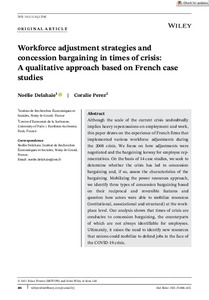Workforce adjustment strategies and concession bargaining in times of crisis: A qualitative approach based on French case studies

Delahaie, Noélie ; Perez, Coralie
2021
52
5
September
406-422
employment ; labour relations ; collective bargaining ; economic recession
Collective bargaining
https://doi.org/10.1111/irj.12342
English
Bibliogr.
"Although the scale of the current crisis undoubtedly implies heavy repercussions on employment and work, this paper draws on the experience of French firms that implemented various workforce adjustments during the 2008 crisis. We focus on how adjustments were negotiated and the bargaining leeway for employee representatives. On the basis of 14 case studies, we seek to determine whether the crisis has led to concession bargaining and, if so, assess the characteristics of the bargaining. Mobilizing the power resources approach, we identify three types of concession bargaining based on their reciprocal and reversible features and question how actors were able to mobilize resources (institutional, associational and structural) at the workplace level. Our analysis shows that times of crisis are conducive to concession bargaining, the counterparts of which are not always identifiable for employees. Ultimately, it raises the need to identify new resources that unions could mobilize to defend jobs in the face of the COVID-19 crisis."
Digital
The ETUI is co-funded by the European Union. Views and opinions expressed are however those of the author(s) only and do not necessarily reflect those of the European Union or the ETUI.